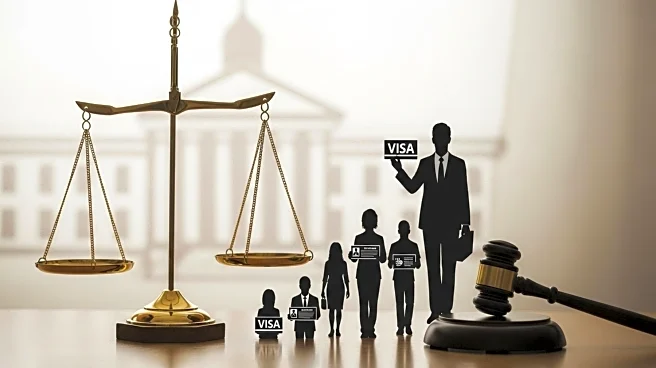What is the story about?
What's Happening?
A coalition of labor unions, health-care providers, academic groups, religious organizations, and individual visa holders has filed a lawsuit against President Trump and several high-ranking officials, challenging a new $100,000 fee imposed on H-1B visa workers. The fee, announced via a White House proclamation on September 19, is required for entry into the U.S. and has caused significant disruption among employers and workers, particularly those in the tech industry. The lawsuit, filed in the U.S. District Court for the Northern District of California, argues that the fee violates the Immigration and Nationality Act and the Administrative Procedure Act. Plaintiffs claim the President lacks the authority to unilaterally impose such fees and that the proclamation has caused immediate harm, including travel disruptions and financial burdens for affected workers.
Why It's Important?
The lawsuit highlights significant concerns about the Trump administration's approach to employment-based immigration, particularly the H-1B visa program, which is crucial for many U.S. industries, including technology, education, and healthcare. The imposition of the fee could exacerbate existing shortages in critical sectors, such as teaching and nursing, and disrupt research activities at universities. Additionally, religious organizations may struggle to find staff with necessary language skills and cultural knowledge. The legal challenge underscores the tension between the administration's immigration policies and the needs of U.S. businesses and institutions that rely on international talent.
What's Next?
The legal proceedings will likely focus on whether the President has the authority to impose such fees and the broader implications for the H-1B visa program. Stakeholders, including businesses and educational institutions, may need to adjust their strategies for recruiting international talent. The outcome of the lawsuit could set a precedent for future immigration policy decisions and impact the administration's ability to implement similar measures. The case may also prompt further debate on the balance between protecting American jobs and maintaining a competitive edge in global industries.
Beyond the Headlines
The lawsuit raises questions about the ethical and legal dimensions of immigration policy, particularly the balance of power between the executive branch and Congress in setting immigration fees. It also highlights the cultural and societal impacts of restricting international talent, which could affect the diversity and innovation within U.S. institutions. Long-term shifts in immigration policy could influence the country's global standing and its ability to attract skilled workers from abroad.















